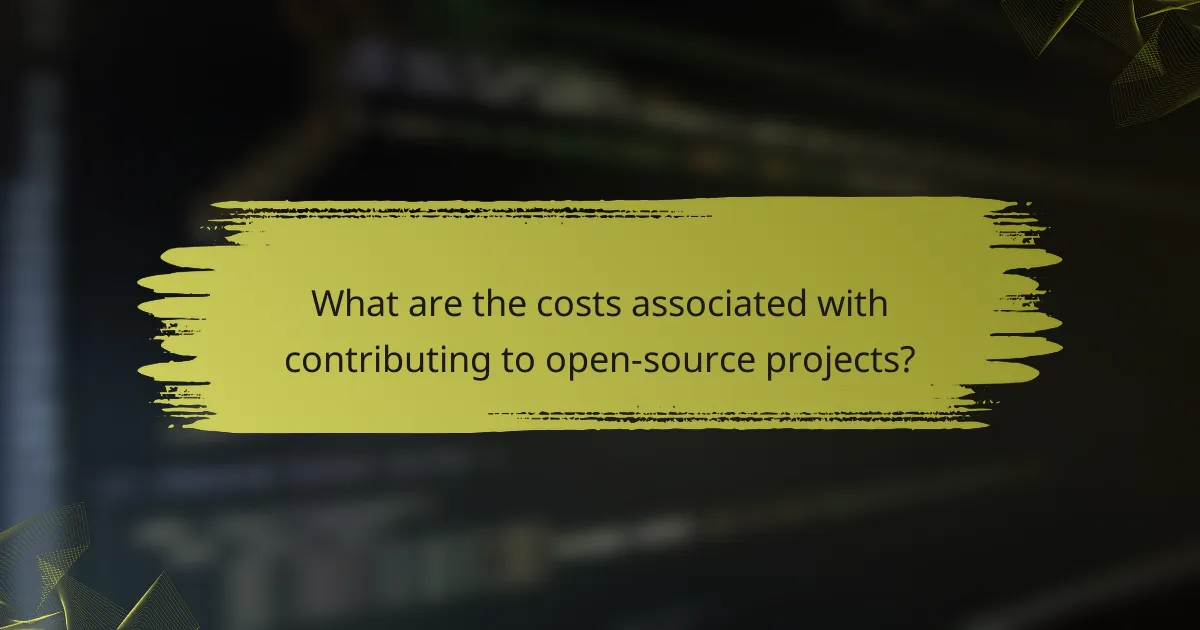Contributing to open-source projects offers numerous financial advantages, such as improved job prospects, skill development, and valuable networking opportunities. By actively participating, individuals can enhance their resumes and potentially unlock sponsorship and freelance work, making it a strategic move for career advancement.

What are the financial benefits of contributing to open-source projects?
Contributing to open-source projects can lead to significant financial benefits, including better job prospects, skill enhancement, and networking opportunities. These contributions not only bolster your resume but can also open doors to sponsorship and freelance opportunities.
Increased job opportunities
Contributing to open-source projects can make you more attractive to potential employers. Many companies value candidates who demonstrate initiative and collaboration through their contributions to community-driven projects.
Job seekers in tech fields may find that showcasing their open-source work on platforms like GitHub can lead to interviews and job offers, especially from startups and tech firms that prioritize innovation.
Enhanced skills and experience
Working on open-source projects allows you to develop and refine your technical skills in real-world scenarios. You can learn new programming languages, tools, and methodologies that are often used in the industry.
This hands-on experience not only boosts your confidence but also provides practical knowledge that can be directly applied to future job roles, making you a more competitive candidate.
Potential for sponsorships
Many open-source contributors have the opportunity to receive sponsorships from companies or platforms that support open-source development. These sponsorships can provide financial support for your work, allowing you to dedicate more time to projects that interest you.
Platforms like GitHub Sponsors and Patreon enable developers to receive monthly contributions from individuals or organizations who appreciate their work, creating a sustainable income stream.
Access to a professional network
Engaging in open-source projects connects you with a diverse community of developers, which can lead to valuable professional relationships. Networking with other contributors can result in collaboration opportunities, mentorship, and even job referrals.
Participating in community events, such as hackathons or conferences, can further enhance your network and expose you to industry leaders and potential employers.
Improved portfolio visibility
Contributing to open-source projects enhances your portfolio by showcasing your skills and commitment to continuous learning. A well-documented project on platforms like GitHub can serve as a strong testament to your abilities.
Employers often review candidates’ GitHub profiles to assess their coding style, problem-solving skills, and ability to work collaboratively, making your contributions a critical part of your professional branding.

How can contributing to open-source projects enhance career growth?
Contributing to open-source projects can significantly enhance career growth by providing practical experience, showcasing skills, and expanding professional networks. Engaging in these projects allows individuals to demonstrate their abilities in real-world scenarios, which can attract potential employers.
Building a strong resume
Open-source contributions can be a valuable addition to your resume, highlighting your technical skills and commitment to continuous learning. Including specific projects, technologies used, and your role in the contributions can make your resume stand out to hiring managers.
Consider listing your contributions on platforms like GitHub, where potential employers can easily view your work. Aim to showcase a diverse range of projects that reflect your versatility and expertise in different programming languages or frameworks.
Gaining industry recognition
Active participation in open-source projects can lead to recognition within the tech community. As you contribute, you may gain visibility among industry leaders and peers, which can open doors to new opportunities and collaborations.
Engaging in well-known projects or contributing to popular repositories can enhance your credibility. Networking with other contributors can also lead to invitations to speak at conferences or participate in workshops, further establishing your reputation.
Learning from experienced developers
Contributing to open-source projects provides a unique opportunity to learn from seasoned developers. By collaborating on projects, you can receive feedback on your code and gain insights into best practices and industry standards.
Take advantage of the mentorship opportunities that arise in these communities. Many experienced developers are willing to share their knowledge, which can accelerate your learning and help you develop new skills that are highly valued in the job market.

What are the costs associated with contributing to open-source projects?
Contributing to open-source projects involves various costs that can impact both individuals and organizations. Understanding these costs is crucial for evaluating the overall benefits of participation.
Time investment
Time investment is one of the most significant costs associated with contributing to open-source projects. Developers often spend hours reviewing code, debugging, and collaborating with other contributors. Depending on the project’s complexity, this can range from a few hours a week to full-time commitments.
To manage time effectively, contributors should set clear goals and prioritize tasks. Using project management tools can help track progress and allocate time efficiently.
Resource allocation
Resource allocation refers to the financial and technical resources needed to contribute effectively. This may include costs for software licenses, development tools, or cloud services. While many open-source projects are free, some may require additional resources for optimal contribution.
It’s advisable to assess the specific needs of the project before committing resources. Contributors should consider whether their current tools are sufficient or if they need to invest in new technologies.
Opportunity costs
Opportunity costs represent the potential benefits lost when choosing to contribute to open-source projects instead of pursuing other activities. For instance, developers could spend that time working on paid projects or enhancing their skills through formal education.
To minimize opportunity costs, contributors should evaluate their current workload and determine if they can afford to invest time in open-source work without sacrificing other important commitments. Balancing personal and professional goals is key to making informed decisions.

What prerequisites should one consider before contributing?
Before contributing to open-source projects, individuals should assess their technical skills and understanding of open-source licenses. These prerequisites ensure that contributions are valuable and compliant with project guidelines.
Technical skills required
Contributors should possess a solid foundation in programming languages relevant to the project, such as Python, JavaScript, or Ruby. Familiarity with version control systems like Git is essential for managing code changes and collaborating effectively with other developers.
Additionally, understanding software development practices, including testing and debugging, is crucial. Contributors may also benefit from knowledge in specific frameworks or libraries that the project utilizes, which can enhance their ability to contribute meaningfully.
Understanding of open-source licenses
A clear grasp of open-source licenses is vital for anyone looking to contribute. Different licenses, such as MIT, GPL, or Apache, dictate how code can be used, modified, and shared. Contributors should familiarize themselves with these licenses to ensure compliance and respect the rights of original authors.
It’s beneficial to review the license of the specific project before contributing. This understanding helps avoid legal issues and promotes a healthy collaborative environment within the open-source community.

Which platforms are best for finding open-source projects?
Several platforms are highly effective for discovering open-source projects, with GitHub being the most prominent. Other notable sites include GitLab and Bitbucket, each offering unique features to help contributors find and engage with projects that match their interests.
GitHub
GitHub is the leading platform for open-source projects, hosting millions of repositories across various programming languages. Users can search for projects based on topics, languages, or even specific issues they want to tackle, making it easy to find relevant contributions.
When exploring GitHub, consider using the “Explore” feature to discover trending projects or the “Issues” tab to find tasks that need attention. Many projects also label issues as “good first issue,” which are ideal for newcomers looking to make their first contribution.
To maximize your experience, create a profile that showcases your skills and interests. Engage with project maintainers and other contributors through comments and pull requests to build relationships and enhance your visibility within the open-source community.



